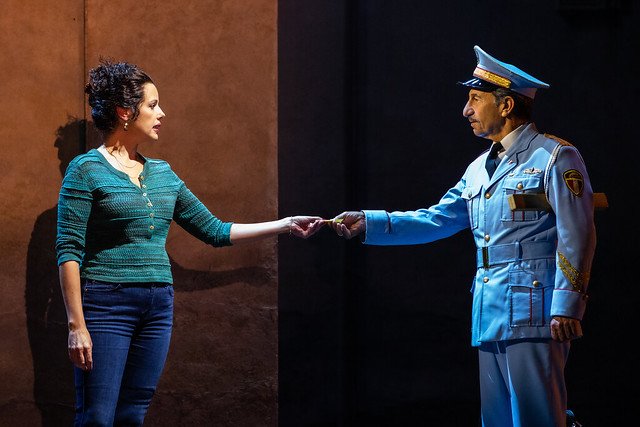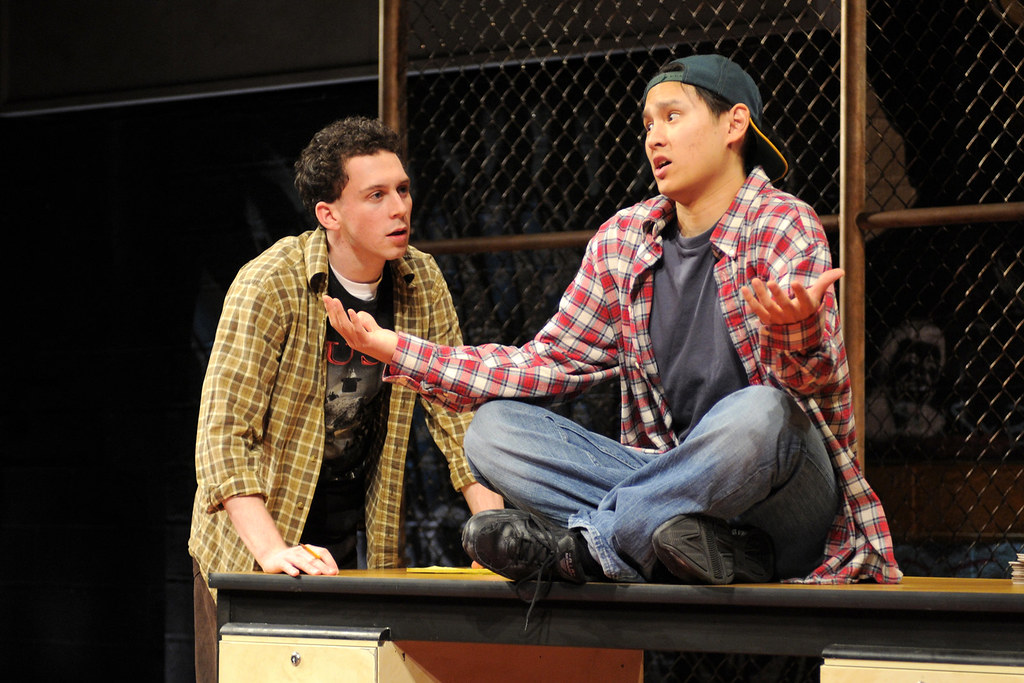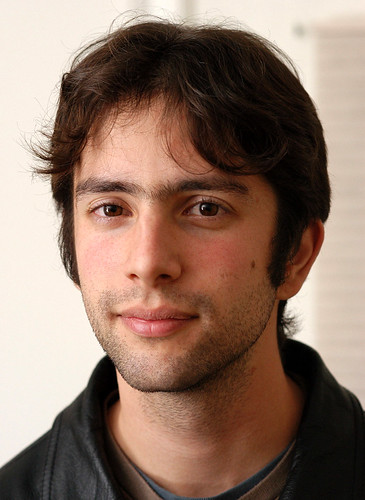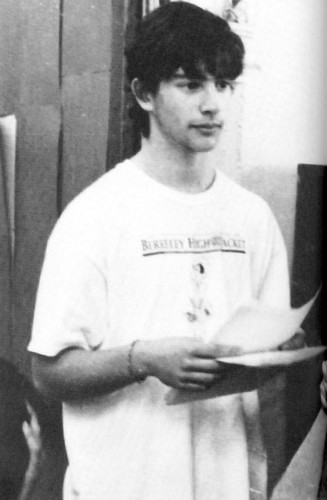
Janet Dacal is Dina and Sasson Gabay is Tewfiq in the national tour of The Band’s Visit, part of the BroadwaySF season at the Golden Gate Theatre. Below: The boys in the band. Photos by Evan Zimmerman, Murphymade.
Like Come from Away, The Band’s Visit is a musical about one set of people in a jam and another set of people offering some assistance – two groups never meant to be together share a little time and space and something wonderful happens. That’s really where the similarities end. While both are Tony Award-winning Broadway shows, The Band’s Visit, whose touring production is at the Golden Gate Theatre as part of the BroadwaySF season, is a very different kind of musical. It’s subtle, gentle and runs deep with the emotion (mostly sadness and longing) of everyday people. Where other Broadway shows kick and flash and shine, this one is still and contemplative, except when music is revealing – and ultimately connecting – its characters.
Composer David Yazbek (The Full Monty, Dirty Rotten Scoundrels, Tootsie) and playwright Itamar Moses (a Berkeley native and revered playwright) have so skillfully adapted the 2007 Israeli movie of the same name that it’s hard to imagine Eran Kolirin’s story now without Yazbek’s decidedly non-showy songs. That’s how complete it now feels (and it was really wonderful to begin with).
Not much happens in this story other than a big misunderstanding. The Alexandria Ceremonial Police Orchestra arrives from Egypt for a special concert at the Arab Cultural Center in Petah Tikvah. But because of issues involving language and Chet Baker, the band ends up in Beit Hatikva, a speck of a town in the desert where nothing ever happens and no one ever comes. So having a troupe of musicians in powder-blue uniforms is a major event.
There’s not another bus until the morning, so the band will stay with various residents and make the best of their predicament. Nobody seems to mind too much, although the heavy security in Israel feels ominous to the visiting Egyptians, so much so that they encourage one another to speak only in English.
The band’s director, Tewfiq, is reserved but cordial. He and Haled, one of the group’s more colorful members, end up staying with Dina, who runs the town’s cafe. As night falls, Haled ends up at a makeshift roller disco with some locals, while Dina and Tewfiq get to know each other over dinner and a walk through what passes as a park (“You have to use your imagination,” Dina says).
Janet Dacal as Dina is tough and magnetic. She begins to feel that the band’s arrival, specifically Twefiq’s arrival, may have been destined for her. But as the strangers get to know one another better, specifically through the gorgeous songs “Omar Sharif,” “Itgara’a” and “Something Different,” reality is more complicated than meet-cute romantic comedy.
As Twefiq, Sasson Gabay offers a rich, admirable and complex portrayal, which is probably not surprising given that he originated the role in the movie 15 years ago. He commands respect from his bandmates, and it’s clear how much the music means to him. His gruff exterior shields a grieving soul, and this unexpected night clearly has an effect on him.
Director David Cromer trusts that this intimate tale will play out in its own time. The show only runs about 100 minutes, but it’s never rushed or frantic. The set design by Scott Pask allows various spots in the city to flow on and off stage, giving us a distinct sense of how isolated this town and its people truly are. Performances throughout are earnest and honest, scaled to the story and not to musical theater. The last third of the show is especially spellbinding, beginning with Joe Joseph’s superb “Haled’s Song About Love” through Dacal and Gabay’s park duet and into “Itzik’s Lullaby” tenderly sung by Clay Singer before the poignant finale. The show finds its deepest groove and transports us into as heartfelt a place as musicals can take us. It’s human, it’s spiritual…it’s simply amazing.
It’s the use of music throughout the show, both underscore and songs, that truly elevates the storytelling here (credit music supervisors Andrea Grody and Dean Sharenow and conductor Adrien Ries). Of course there’s Yazbek’s stunning music, but there’s also space for people to connect over a love of “Summertime” warbled over a shared dinner, or Chet Baker’s take on “My Funny Valentine,” which soothes the end of an unusual night and gives us a glimpse into the heart of the musician playing it. There are violin and clarinet solos to melt the heart as well as instruments you don’t hear in every musical theater band, like the darbouka, riq and oud.
Not everything we see these days has to be about COVID, but it’s hard not to feel the connection in the loneliness and desperate hope of the small town inhabitants, especially as they feel their worlds enlarging, even if just a bit, through the brief visit from the band and the connection they feel. From isolation there’s connection through the shared language of music. In the most challenging times, as we have seen, art can mean more than just about anything. It can provide some relief, some joy, some emotional purging. It can also make us feel part of something bigger than ourselves – kind of like being players in a big, beautiful band.
FOR MORE INFORMATION
The Band’s Visit continues through Feb. 6 at the Golden Gate Theatre, 1 Taylor St., San Francisco. Tickets are $56-$256. Call 888-746-1799 or visit broadwaysf.com
Read about BroadwaySF’s COVID policies here.





 The 30-year-old writer headed back to the year 1994 to dramatically reconstruct his junior year at Berkeley High School, when he was editor of the school newspaper, The Jacket, and racial tensions were dividing the student body.
The 30-year-old writer headed back to the year 1994 to dramatically reconstruct his junior year at Berkeley High School, when he was editor of the school newspaper, The Jacket, and racial tensions were dividing the student body.
 Moses (in a photo from his high school yearbook at right, not the Jacket T-shirt) joined the school newspaper staff in his freshman year and has been writing since (he was also a humor columnist for the Yale Daily News in his college years). But the writer says he’s still not sure if writing is “his thing.”
Moses (in a photo from his high school yearbook at right, not the Jacket T-shirt) joined the school newspaper staff in his freshman year and has been writing since (he was also a humor columnist for the Yale Daily News in his college years). But the writer says he’s still not sure if writing is “his thing.”

 The day-long workshop will examine how journalism and theatre can inspire debate and ultimately create large-scale change within a community. Teens will participate in a morning discussion on the roles of performance and the media, and then break into smaller groups led by professional reporters to brainstorm compelling story angles inspired by the day’s debate. The panelists will include Kristin Bender of the Oakland Tribune, yours truly (freelance reporter Chad Jones), nationally renowned playwright Itamar Moses (at right in his Berkeley High days), artistic director Tony Taccone, and other respected local journalists.
The day-long workshop will examine how journalism and theatre can inspire debate and ultimately create large-scale change within a community. Teens will participate in a morning discussion on the roles of performance and the media, and then break into smaller groups led by professional reporters to brainstorm compelling story angles inspired by the day’s debate. The panelists will include Kristin Bender of the Oakland Tribune, yours truly (freelance reporter Chad Jones), nationally renowned playwright Itamar Moses (at right in his Berkeley High days), artistic director Tony Taccone, and other respected local journalists.